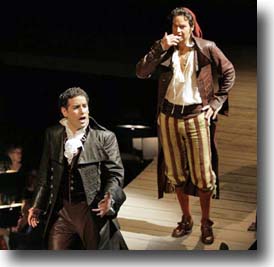This page was last updated on: March 16, 2007
REVIEW
Il barbiere di Siviglia, New York Metropolitan Opera, March 2007

Photo of Juan Diego Flórez & Peter Mattei by Ken Howard
A 'Barber' Debut for DiDonato
Jay Nordlinger, The New York Sun, 16 March 2007
In November 2005, a mezzo-soprano made her Metropolitan Opera debut as Cherubino in Mozart's "Marriage of Figaro." It was one of those debuts we describe as "sensational." The world is lucky enough to have several excellent Cherubinos at the moment, but, even in this group, the singer onstage that night stood out. She was Joyce DiDonato, from Kansas. She was accurate, stylish, and loaded with personality. In brief, she delivered all the operatic goods.
Then, a couple of weeks later, she appeared as Stéphano in the Met's new production of Gounod's "Roméo et Juliette." Now, Stéphano is pretty much a nothing role Shakespeare didn't even put it in the play! But Ms. DiDonato made a virtual star turn out of it, lighting up the stage. The proceedings were newly alive when she was around. When she exited, you wanted to say, "Hey, can't she come back? To heck with Romeo and Juliet, those star-crossed lovers."
Ms. DiDonato is known worldwide as a Rossini singer, and on Wednesday night she made what you might call her Met Rossini debut: She sang Rosina in "The Barber of Seville." The Met's new production of "The Barber" opened last November, with Diana Damrau as Rosina. Ms. Damrau, as you know, is a sparkling coloratura soprano, and she sparkled like mad that night. Many people prefer Rosina to be a mezzo, but, as between Ms. Damrau and Ms. DiDonato, you could simply toss a coin. You don't complain about either.
Rosina is clever, bold, and fetching. She is a sparkplug, and so is Ms. DiDonato and so is Ms. Damrau. These are natural matches, or, put another way: instances of natural casting.
Early in Act I, Rosina sings a famous aria, "Una voce poco fa." And how did Ms. DiDonato do? Well, she started flat on her back lying down, that is. And she sang slowly, deliberately. She was savoring every note and every word, and she would continue to do so as the aria progressed, picking up speed.
Her intonation was spot-on, and she showed no sign of effort. When she was cute, she wasn't cutesy. Passagework was elaborate, and clean as a whistle. Her Italian is really Italianate, complete with some nasal vowels. She acted all through the aria, but with no harm whatsoever to her singing. Her big B at the end was free and beautiful. She just slew the aria, and slew the audience as well.
And she never let up, all evening long. It takes something to be as interesting in recitative as in aria, and Ms. DiDonato almost was. Act II finds Rosina taking a voice lesson, and Ms. DiDonato put on a fine semi-parody you get the feeling this mezzo could be an actress, even if she couldn't sing (perish the thought). And speaking of singing: You know the type of singer who is so secure, technically and otherwise, that you can simply sit back in your chair, without having to be nervous? Ms. DiDonato is such a singer, and thus a rarity.
In the role of Count Almaviva was another rarity: Juan Diego Flórez, king of Rossini tenors. He did nothing to jeopardize his crown on Wednesday night. He was astounding in flashy portions, sure, but he was also impressive in more modest things. For example, I doubt the little A-minor serenade in Act I has ever been more beautiful.
At the end of the opera, he sang "Cessa di più resistere," which, in a different Rossini opera "La Cenerentola" is "Non più mesta." The latter version is a specialty of any Rossini mezzo, and therefore one of Ms. DiDonato's. (She sang it as an encore in her recital at Weill Hall earlier this month.) How irritating it must be to have to stand there and watch a tenor sing it, stealing and concluding the show! Every cast member was sharp on this occasion (and not of pitch): Peter Mattei as Figaro, John Del Carlo as Dr. Bartolo, John Relyea as Don Basilio. Mr. Relyea was made up to look like a member of the Addams family, and he has a ball in "La Calunnia." Claudia Waite was typically noteworthy in one of her minor roles, the maid Berta. Maurizio Benini conducted with pep and coordination (unlike at November's premiere).
In short, everything and everyone clicked and this is especially desirable in a classic ensemble piece like "The Barber." As my colleague Martin Bernheimer sometime says, it was one of those nights at the opera.